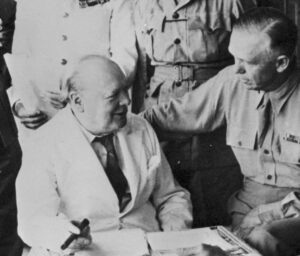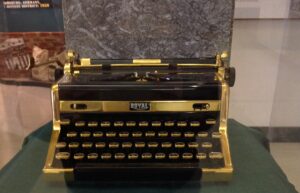 This past Wednesday, 30 November, was Winston Churchill’s 142nd birthday (he was born in 1874). The occasion was accompanied, as often is, by various dinners around the world and myriad toasts offered to the great man’s memory-and appropriately so. Winston Churchill, bon viveur, is an easy man to commemorate in such a fashion. That fact, however, does not diminish his stature as soldier nor statesman, but the many other facets of his outsized personality serve to make his memory more easily preserved. Churchill’s many witticisms and quips are also tremendous aide de memoirs, even if, quite often Churchill did not actually say them; the mere fact that they sound “Churchillian” is enough to guarantee a positive response; Churchill’s reputation precedes them.
This past Wednesday, 30 November, was Winston Churchill’s 142nd birthday (he was born in 1874). The occasion was accompanied, as often is, by various dinners around the world and myriad toasts offered to the great man’s memory-and appropriately so. Winston Churchill, bon viveur, is an easy man to commemorate in such a fashion. That fact, however, does not diminish his stature as soldier nor statesman, but the many other facets of his outsized personality serve to make his memory more easily preserved. Churchill’s many witticisms and quips are also tremendous aide de memoirs, even if, quite often Churchill did not actually say them; the mere fact that they sound “Churchillian” is enough to guarantee a positive response; Churchill’s reputation precedes them.
General Marshall, by contrast, is not remembered in that same ebullient fashion and by design, on the part of Marshall himself. Always willing to stand back and let others take the credit or the applause, Marshall’s commitment to duty, to service, was reward in itself. Winston Churchill magisterial History of the Second World War written across six sizable volumes and between 1948–1953, accurately captured the role Churchill believed he play it that conflict. “History,” Churchill once noted, “will be kind to me for I intend to write that history.” As we all know, he did write that history, and it was indeed indeed most kind. Its completion secured, amongst other things, the Nobel Prize for literature in 1953.
 Marshall, of course, left no similar literary record of his role in that war, nor specifically how he saw his role in “succeeding generations must not be allowed to forget his achievements and his example.” A typewriter was given to Marshall by a keen publisher who hoped that the physical gift of a writing device would prompt Marshall to change his mind and the fact of its gold plate encourage him to think of the rich rewards that would be forthcoming. Marshall, of course, declined.
Marshall, of course, left no similar literary record of his role in that war, nor specifically how he saw his role in “succeeding generations must not be allowed to forget his achievements and his example.” A typewriter was given to Marshall by a keen publisher who hoped that the physical gift of a writing device would prompt Marshall to change his mind and the fact of its gold plate encourage him to think of the rich rewards that would be forthcoming. Marshall, of course, declined.
The irony here is that Churchill well knew that the reticence his great friend displayed for personal recognition would hurt his posthumous reputation, or at least the wider memory of it. Marshall could and would do nothing else; he would not have been the man he was had he done anything else. In 1958, Churchill wrote to John Hagan, then President of the Marshall Research Library, underscoring the fact that Marshall and all he stood for must be remembered and that “succeeding generations must not be allowed to forget his achievements and his example.” We at the Marshall Foundation work to that end, each and every day.
